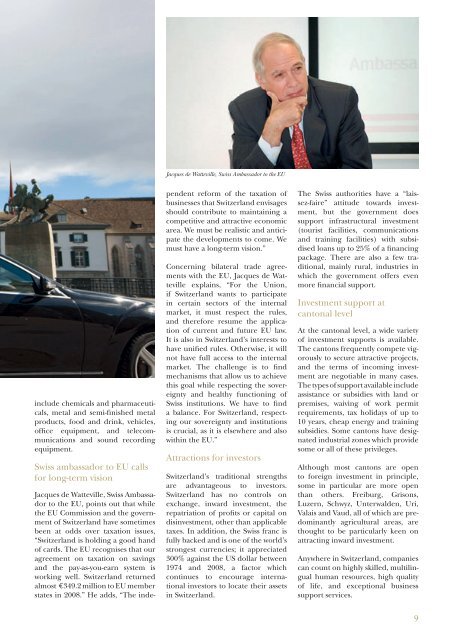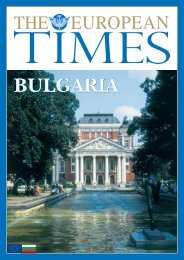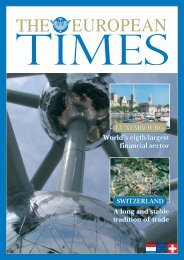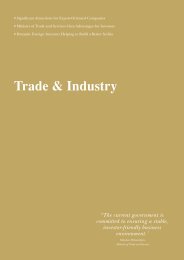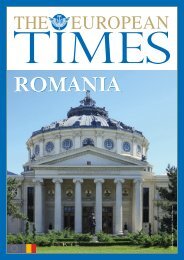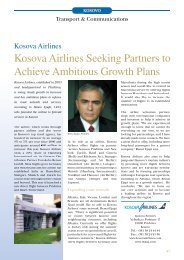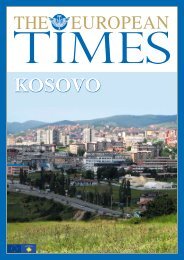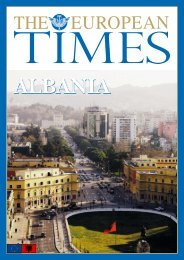Download Switzerland Report - The European Times
Download Switzerland Report - The European Times
Download Switzerland Report - The European Times
Create successful ePaper yourself
Turn your PDF publications into a flip-book with our unique Google optimized e-Paper software.
Jacques de Watteville, Swiss Ambassador to the EU<br />
include chemicals and pharmaceuticals,<br />
metal and semi-finished metal<br />
products, food and drink, vehicles,<br />
office equipment, and telecommunications<br />
and sound recording<br />
equipment.<br />
Swiss ambassador to EU calls<br />
for long-term vision<br />
Jacques de Watteville, Swiss Ambassador<br />
to the EU, points out that while<br />
the EU Commission and the government<br />
of <strong>Switzerland</strong> have sometimes<br />
been at odds over taxation issues,<br />
“<strong>Switzerland</strong> is holding a good hand<br />
of cards. <strong>The</strong> EU recognises that our<br />
agreement on taxation on savings<br />
and the pay-as-you-earn system is<br />
working well. <strong>Switzerland</strong> returned<br />
almost €349.2 million to EU member<br />
states in 2008.” He adds, “<strong>The</strong> independent<br />
reform of the taxation of<br />
businesses that <strong>Switzerland</strong> envisages<br />
should contribute to maintaining a<br />
competitive and attractive economic<br />
area. We must be realistic and anticipate<br />
the developments to come. We<br />
must have a long-term vision.”<br />
Concerning bilateral trade agreements<br />
with the EU, Jacques de Watteville<br />
explains, “For the Union,<br />
if <strong>Switzerland</strong> wants to participate<br />
in certain sectors of the internal<br />
market, it must respect the rules,<br />
and therefore resume the application<br />
of current and future EU law.<br />
It is also in <strong>Switzerland</strong>’s interests to<br />
have unified rules. Otherwise, it will<br />
not have full access to the internal<br />
market. <strong>The</strong> challenge is to find<br />
mechanisms that allow us to achieve<br />
this goal while respecting the sovereignty<br />
and healthy functioning of<br />
Swiss institutions. We have to find<br />
a balance. For <strong>Switzerland</strong>, respecting<br />
our sovereignty and institutions<br />
is crucial, as it is elsewhere and also<br />
within the EU.”<br />
Attractions for investors<br />
<strong>Switzerland</strong>’s traditional strengths<br />
are advantageous to investors.<br />
<strong>Switzerland</strong> has no controls on<br />
exchange, inward investment, the<br />
repatriation of profits or capital on<br />
disinvestment, other than applicable<br />
taxes. In addition, the Swiss franc is<br />
fully backed and is one of the world’s<br />
strongest currencies; it appreciated<br />
300% against the US dollar between<br />
1974 and 2008, a factor which<br />
continues to encourage international<br />
investors to locate their assets<br />
in <strong>Switzerland</strong>.<br />
<strong>The</strong> Swiss authorities have a “laissez-faire”<br />
attitude towards investment,<br />
but the government does<br />
support infrastructural investment<br />
(tourist facilities, communications<br />
and training facilities) with subsidised<br />
loans up to 25% of a financing<br />
package. <strong>The</strong>re are also a few traditional,<br />
mainly rural, industries in<br />
which the government offers even<br />
more financial support.<br />
Investment support at<br />
cantonal level<br />
At the cantonal level, a wide variety<br />
of investment supports is available.<br />
<strong>The</strong> cantons frequently compete vigorously<br />
to secure attractive projects,<br />
and the terms of incoming investment<br />
are negotiable in many cases.<br />
<strong>The</strong> types of support available include<br />
assistance or subsidies with land or<br />
premises, waiving of work permit<br />
requirements, tax holidays of up to<br />
10 years, cheap energy and training<br />
subsidies. Some cantons have designated<br />
industrial zones which provide<br />
some or all of these privileges.<br />
Although most cantons are open<br />
to foreign investment in principle,<br />
some in particular are more open<br />
than others. Freiburg, Grisons,<br />
Luzern, Schwyz, Unterwalden, Uri,<br />
Valais and Vaud, all of which are predominantly<br />
agricultural areas, are<br />
thought to be particularly keen on<br />
attracting inward investment.<br />
Anywhere in <strong>Switzerland</strong>, companies<br />
can count on highly skilled, multilingual<br />
human resources, high quality<br />
of life, and exceptional business<br />
support services.<br />
9


